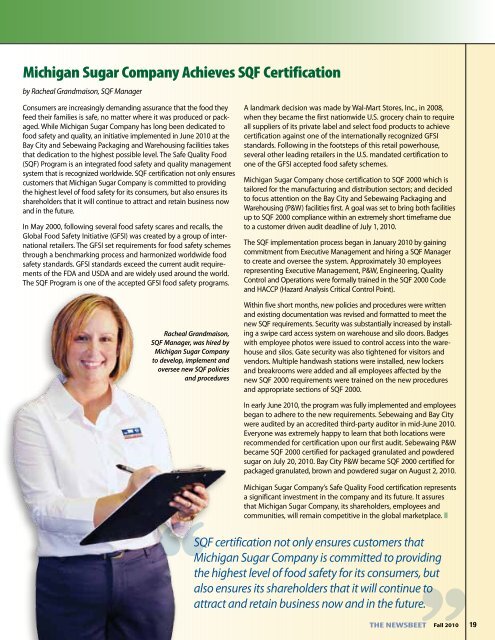You also want an ePaper? Increase the reach of your titles
YUMPU automatically turns print PDFs into web optimized ePapers that Google loves.
<strong>Michigan</strong> <strong>Sugar</strong> <strong>Company</strong> Achieves SQF Certification<br />
by Racheal Grandmaison, SQF Manager<br />
Consumers are increasingly demanding assurance that the food they<br />
feed their families is safe, no matter where it was produced or packaged.<br />
While <strong>Michigan</strong> <strong>Sugar</strong> <strong>Company</strong> has long been dedicated to<br />
food safety and quality, an initiative implemented in June 2010 at the<br />
Bay City and Sebewaing Packaging and Warehousing facilities takes<br />
that dedication to the highest possible level. The Safe Quality Food<br />
(SQF) Program is an integrated food safety and quality management<br />
system that is recognized worldwide. SQF certification not only ensures<br />
customers that <strong>Michigan</strong> <strong>Sugar</strong> <strong>Company</strong> is committed to providing<br />
the highest level of food safety for its consumers, but also ensures its<br />
shareholders that it will continue to attract and retain business now<br />
and in the future.<br />
In May 2000, following several food safety scares and recalls, the<br />
Global Food Safety Initiative (GFSI) was created by a group of international<br />
retailers. The GFSI set requirements for food safety schemes<br />
through a benchmarking process and harmonized worldwide food<br />
safety standards. GFSI standards exceed the current audit requirements<br />
of the FDA and USDA and are widely used around the world.<br />
The SQF Program is one of the accepted GFSI food safety programs.<br />
Racheal Grandmaison,<br />
SQF Manager, was hired by<br />
<strong>Michigan</strong> <strong>Sugar</strong> <strong>Company</strong><br />
to develop, implement and<br />
oversee new SQF policies<br />
and procedures<br />
A landmark decision was made by Wal-Mart Stores, Inc., in 2008,<br />
when they became the first nationwide U.S. grocery chain to require<br />
all suppliers of its private label and select food products to achieve<br />
certification against one of the internationally recognized GFSI<br />
standards. Following in the footsteps of this retail powerhouse,<br />
several other leading retailers in the U.S. mandated certification to<br />
one of the GFSI accepted food safety schemes.<br />
<strong>Michigan</strong> <strong>Sugar</strong> <strong>Company</strong> chose certification to SQF 2000 which is<br />
tailored for the manufacturing and distribution sectors; and decided<br />
to focus attention on the Bay City and Sebewaing Packaging and<br />
Warehousing (P&W) facilities first. A goal was set to bring both facilities<br />
up to SQF 2000 compliance within an extremely short timeframe due<br />
to a customer driven audit deadline of July 1, 2010.<br />
The SQF implementation process began in January 2010 by gaining<br />
commitment from Executive Management and hiring a SQF Manager<br />
to create and oversee the system. Approximately 30 employees<br />
representing Executive Management, P&W, Engineering, Quality<br />
Control and Operations were formally trained in the SQF 2000 Code<br />
and HACCP (Hazard Analysis Critical Control Point).<br />
Within five short months, new policies and procedures were written<br />
and existing documentation was revised and formatted to meet the<br />
new SQF requirements. Security was substantially increased by installing<br />
a swipe card access system on warehouse and silo doors. Badges<br />
with employee photos were issued to control access into the warehouse<br />
and silos. Gate security was also tightened for visitors and<br />
vendors. Multiple handwash stations were installed, new lockers<br />
and breakrooms were added and all employees affected by the<br />
new SQF 2000 requirements were trained on the new procedures<br />
and appropriate sections of SQF 2000.<br />
In early June 2010, the program was fully implemented and employees<br />
began to adhere to the new requirements. Sebewaing and Bay City<br />
were audited by an accredited third-party auditor in mid-June 2010.<br />
Everyone was extremely happy to learn that both locations were<br />
recommended for certification upon our first audit. Sebewaing P&W<br />
became SQF 2000 certified for packaged granulated and powdered<br />
sugar on July 20, 2010. Bay City P&W became SQF 2000 certified for<br />
packaged granulated, brown and powdered sugar on August 2, 2010.<br />
<strong>Michigan</strong> <strong>Sugar</strong> <strong>Company</strong>’s Safe Quality Food certification represents<br />
a significant investment in the company and its future. It assures<br />
that <strong>Michigan</strong> <strong>Sugar</strong> <strong>Company</strong>, its shareholders, employees and<br />
communities, will remain competitive in the global marketplace. n<br />
SQF certification not only ensures customers that<br />
<strong>Michigan</strong> <strong>Sugar</strong> <strong>Company</strong> is committed to providing<br />
the highest level of food safety for its consumers, but<br />
also ensures its shareholders that it will continue to<br />
attract and retain business now and in the future.<br />
THE NEWSBEET Fall 2010 19


